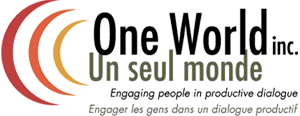Unlocking Answers and Different Ways of Learning through Facilitation
 Mention the word facilitate to people and it can stir up multiple images such as; teachers and blackboards, a conductor with baton in hand, or just someone making things happen. In fact a facilitator is a type of enabler and to a company undergoing major change, an NGO needing to re-align their vision and programming directions, a multi-interest group working to find new ways to address a pressing issue, and others, a facilitator can be an invaluable asset to draw upon. A skilled facilitator can help spark new ways of thinking and innovation, guide informed and effective decision-making, and bring out the best in people, an organization or a collective.
Mention the word facilitate to people and it can stir up multiple images such as; teachers and blackboards, a conductor with baton in hand, or just someone making things happen. In fact a facilitator is a type of enabler and to a company undergoing major change, an NGO needing to re-align their vision and programming directions, a multi-interest group working to find new ways to address a pressing issue, and others, a facilitator can be an invaluable asset to draw upon. A skilled facilitator can help spark new ways of thinking and innovation, guide informed and effective decision-making, and bring out the best in people, an organization or a collective.
Uncovering Wisdom versus Conveying Knowledge
An important facilitator role is related to learning and knowledge building – but this role is very different from that of a traditional teacher. Rather than coming in as a subject matter expert, with pre-set assumptions and answers, a facilitators role is more about designing and conducting a discovery process. It is about helping an organization or group tap and draw upon knowledge, information and collective wisdom so that they can discover for themselves how to address an issue or resolve a particular problem.
A skilled facilitator may not be an expert on the issue at hand. But they are experts at helping teams learn how to more effectively meet goals. Where teachers often need to assume a key role of conveyers of knowledge, facilitators design and implement processes and draw upon a range of creative tools and methodologies that engage groups of people in ways that allow them to build knowledge and make discoveries on their own. Essentially, when you teach, you provide right answers and play a key role in transferring knowledge. When you facilitate, you provide the right questions to guide the kinds of conversations that will uncover wisdom within – the group and the people in it.
Shifting the Power Base
While learning is a desired outcome of both teaching and facilitating, there are fundamental differences in expectations and where the power and responsibility is nested. Traditionally, teachers are expected to assume the role of authoritative expert and in fulfilling that role, must also assume a particular position of power and responsibility. The teacher must clearly define the knowledge that their students are to learn and are responsible for packaging and conveying that knowledge in the most useful way. In that way the learning environment is more often top-down and closed.
By contrast, a facilitator is not expected to be authoritative. On the contrary it is important that they remain neutral, sharing power among many. With no “right” or “wrong” answer, the learning environment is open, flowing in multiple directions. In fact, a good facilitator needs to see themselves as part of a mutual learning process. Every group is different, as are their needs and style of working. As such, while a skilled facilitator must assume the key responsibility for designing and guiding a process, it is critical that they are responsive to the needs and realities of the group they are working with, and always ready and able to adapt their process if the situation demands. In this kind of atmosphere of shared learning and discovery there is also mutual accountability for the outcomes.
Teachers convey knowledge and give information. Facilitators are more inclined to help people understand the process and complexities behind the knowledge rather than just the facts that support it. A teacher’s role is to be the expert. By some standards, if you are not capable of providing answers, they may not be seen as competent. By contrast, a facilitator helps experts unlock answers.
